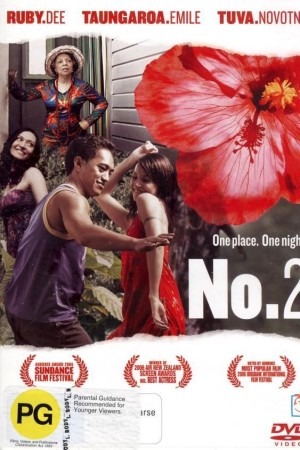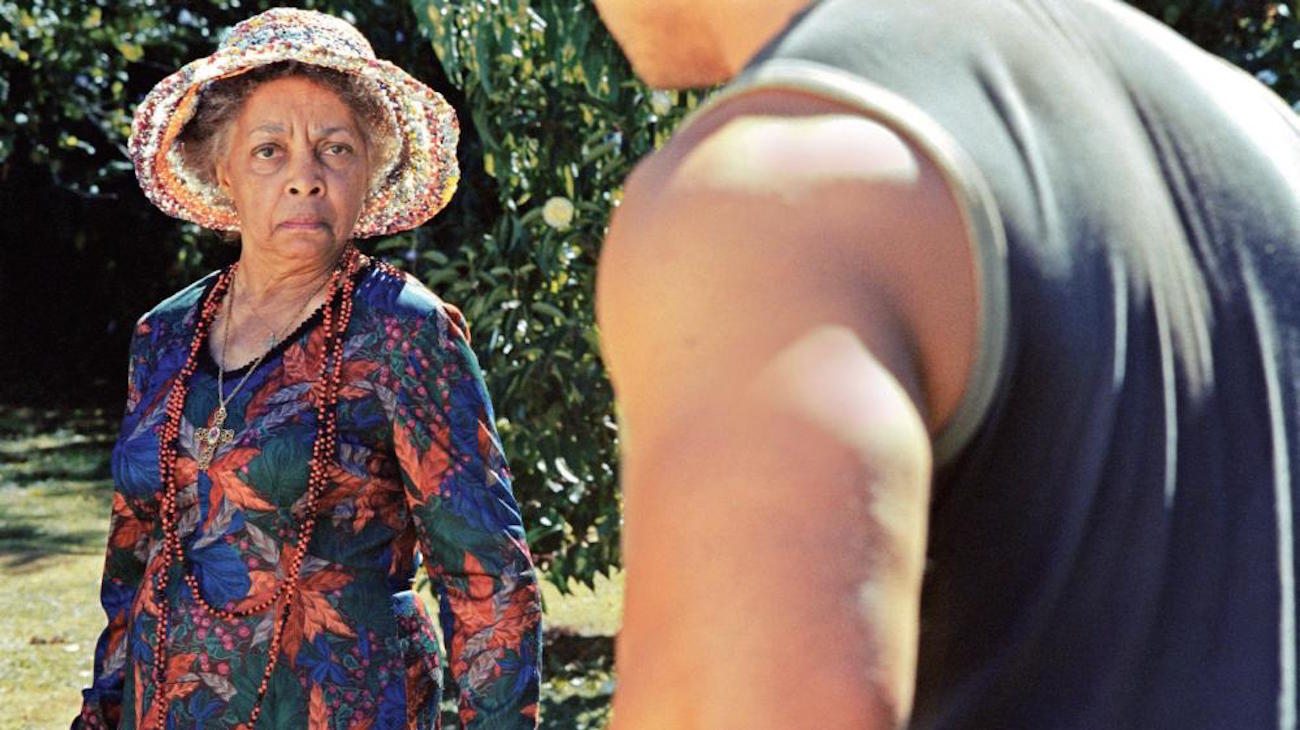
The 42nd Chicago International Film Festival
It is possible though rare for a film to be too generous. Certainly, it never happens in Hollywood, where warmth and humanity are marketing tools; but there is such a thing as a genuine and heartfelt and human motion picture that, without ever lapsing into cloying sentimentality, manages to be so loving to its characters and so gracious to the audience that it becomes almost impossible to figure out what the point is.
You've doubtlessly guessed that No. 2 is one of those movies. I don't want to seem like I didn't enjoy it; I enjoyed it thoroughly. But it's so endlessly nice and convinced of the goodness of the world, I didn't really get anything out of it. The film has its own catharsis, and while it's nice to watch, it's also kind of boring.
Ruby Dee plays Nanna Maria, an elderly Fijian woman living in the Mount Roskill neighborhood of Auckland, New Zealand. Her children are estranged from her, and her needs are met almost entirely by her five grandchildren. Early one morning, Maria announces that she wishes to have a grand party attended only by her grandchildren, to name her successor. The five are dubious, but decide to humor her, and if you guess that the party will end as a grand affair attended not only by Maria and her grandchildren, but her children, and two white people dating her grandchildren, and the local priest, and most of the neighbors, then congratulations! You have at some point in your life seen a movie.
Familiarity vs. originality isn't really the point. The point is to watch a splintered family come together to honor the one thing they all have in common, the bold and gregarious matriarch who birthed them all. And come together they certainly do, despite what appear to be very angry disagreements.
One of the chief flaws of the script by Toa Fraser, based on his play, is that we have no sense of why the family broke apart in the first place, or when. It was sometime after the death of Nanna Maria's Sicilian husband 12 years prior, and the grandchildren suggest that it is at least a few years in the past, but there are absolutely no stakes; we have no way of knowing who is more or less justified, whether there have been any prior attempts at reconciliation. It makes the triumph of seeing the family come together far less powerful, simply because we have no conception of the force holding them apart. Far more interesting are the power plays amongst the grandchildren (who gets the house, who is the successor, and are they the same person?), the petty jealousies (why is his girlfriend better than my boyfriend?) and even a subtle dose of class tension (Maria's apparent favorite is also considerably wealthier than any of his cousins).
In a film where what happens is so rote, we must consider how it happens, and unfortunately writer/director Fraser isn't a very gifted filmmaker in this, his debut. It's a classically stagey "the camera is for capturing the action and THAT'S IT" sort of film visually, which is a shame given the film's reasonably unique setting: New Zealand-based films without hobbits or zombies are unknown in this country, and it would have been nice to get a better sense of what appears to be the rough side of Auckland.
Fraser lucks out in having a fantastic cast. Ruby Dee is transfixing as Nanna Maria: the woman is a bit confused and doddering, but still full of the vitality that made her the matriarch she is today. Dee clearly possesses this vitality herself (she spoke at the screening I attended, and was given tribute by several generations of members of her sorority), and she channels it into an extraordinarily arresting performance. It is impossible to take your eyes off of Maria: she is less a person and more a force, an irresistable pressure bending people to her will. And while none of the supporting cast leaps out (unless it is Mia Blake as Charlene, the chief attendant to Maria's needs), they are all fine performances. The characters are written as archetypes, but they are played as individuals, and this makes a great deal of difference.
Ultimately, for all that it is slight, I can't complain about No. 2 too harshly. It is a lovely and nice film, and extraordinarily generous; and coming as it did for me on the heels of films about the death throes of Great Britain, insane Greek prostitutes, and a borderline-psychopathic Korean woman who changes her face out of boredom, generosity in a film can be appreciated as the cinematic soul food it is so clearly meant to be.
7/10
You've doubtlessly guessed that No. 2 is one of those movies. I don't want to seem like I didn't enjoy it; I enjoyed it thoroughly. But it's so endlessly nice and convinced of the goodness of the world, I didn't really get anything out of it. The film has its own catharsis, and while it's nice to watch, it's also kind of boring.
Ruby Dee plays Nanna Maria, an elderly Fijian woman living in the Mount Roskill neighborhood of Auckland, New Zealand. Her children are estranged from her, and her needs are met almost entirely by her five grandchildren. Early one morning, Maria announces that she wishes to have a grand party attended only by her grandchildren, to name her successor. The five are dubious, but decide to humor her, and if you guess that the party will end as a grand affair attended not only by Maria and her grandchildren, but her children, and two white people dating her grandchildren, and the local priest, and most of the neighbors, then congratulations! You have at some point in your life seen a movie.
Familiarity vs. originality isn't really the point. The point is to watch a splintered family come together to honor the one thing they all have in common, the bold and gregarious matriarch who birthed them all. And come together they certainly do, despite what appear to be very angry disagreements.
One of the chief flaws of the script by Toa Fraser, based on his play, is that we have no sense of why the family broke apart in the first place, or when. It was sometime after the death of Nanna Maria's Sicilian husband 12 years prior, and the grandchildren suggest that it is at least a few years in the past, but there are absolutely no stakes; we have no way of knowing who is more or less justified, whether there have been any prior attempts at reconciliation. It makes the triumph of seeing the family come together far less powerful, simply because we have no conception of the force holding them apart. Far more interesting are the power plays amongst the grandchildren (who gets the house, who is the successor, and are they the same person?), the petty jealousies (why is his girlfriend better than my boyfriend?) and even a subtle dose of class tension (Maria's apparent favorite is also considerably wealthier than any of his cousins).
In a film where what happens is so rote, we must consider how it happens, and unfortunately writer/director Fraser isn't a very gifted filmmaker in this, his debut. It's a classically stagey "the camera is for capturing the action and THAT'S IT" sort of film visually, which is a shame given the film's reasonably unique setting: New Zealand-based films without hobbits or zombies are unknown in this country, and it would have been nice to get a better sense of what appears to be the rough side of Auckland.
Fraser lucks out in having a fantastic cast. Ruby Dee is transfixing as Nanna Maria: the woman is a bit confused and doddering, but still full of the vitality that made her the matriarch she is today. Dee clearly possesses this vitality herself (she spoke at the screening I attended, and was given tribute by several generations of members of her sorority), and she channels it into an extraordinarily arresting performance. It is impossible to take your eyes off of Maria: she is less a person and more a force, an irresistable pressure bending people to her will. And while none of the supporting cast leaps out (unless it is Mia Blake as Charlene, the chief attendant to Maria's needs), they are all fine performances. The characters are written as archetypes, but they are played as individuals, and this makes a great deal of difference.
Ultimately, for all that it is slight, I can't complain about No. 2 too harshly. It is a lovely and nice film, and extraordinarily generous; and coming as it did for me on the heels of films about the death throes of Great Britain, insane Greek prostitutes, and a borderline-psychopathic Korean woman who changes her face out of boredom, generosity in a film can be appreciated as the cinematic soul food it is so clearly meant to be.
7/10
Categories: ciff, domestic dramas, oz/kiwi cinema






